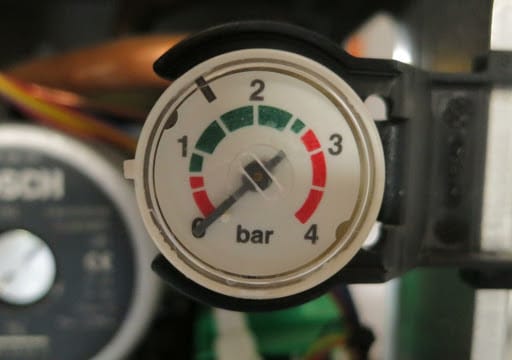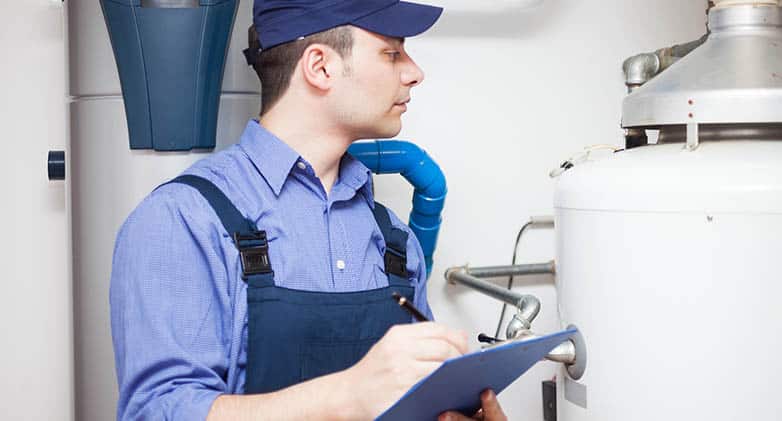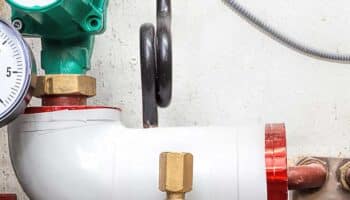Some household tasks are more apparent than others.
It’s easy to tell when the dishes need washing, the toilet needs unclogging, or the draft from your windows need fixing. But when it comes to monitoring your boiler pressure, it can be easy to overlook and forget.
Still, it’s important not to forego inspecting your boiler for too long. High pressure can eventually cause issues with your boiler. If neglected for too long, it can pose a threat to the lifespan of your boiler.
What are some reasons why your boiler pressure is too high? How often should you monitor your boiler pressure, and what should you do if it’s too high?
Read on to discover the three reasons for high boiler pressure, along with some quick, easy fixes!
Boiler Pressure Explained
You rely on your gas or electric boiler for hot water and warm air. Without it, you’ll find yourself taking some pretty lukewarm showers and feeling quite chilly during the cold times of the year.
Inside your boiler are air and water, and your entire heating system relies on a balance between these elements. Without it, the boiler becomes unstable. As a result, the boiler is unable to release enough warm air or deliver enough hot water.
A small increase in pressure is perfectly normal. After all, the water needs to expand to heat up properly for the radiators and tap water fixtures. When a small uptick in pressure occurs, the boiler’s pressure relief valve kicks in and controls the minor increase by releasing the excess pressure.
However, there are a variety of factors that can make your boiler system go awry. Before we delve into all the reasons why you have high boiler pressure, let’s first explore how to check your boiler pressure.
How Do You Check the Boiler Pressure?
Whether you have a gas or an electric boiler, your unit will likely have a pressure gauge on the front of it. This is where you’ll check the boiler pressure.

If you have a newer model, your pressure gauge may be an LED screen that can read off the pressure and indicate when it has increased. Some pressure gauges on older units feature a single needle. This needle can pinpoint when the pressure goes in the red zone or otherwise becomes too low or too high.
Other pressure gauges can feature two needles; one that tells you when the pressure is too low or too high, as well as an additional one that will tell you where the pressure ought to be.
What Pressure Should Your Boiler Be?
Anywhere between 1 and 2 is ideal. Generally speaking, anything over 2.5 is too high (and below 1 is too low.) Read your manual for a clearer idea of the model’s ideal pressure levels.
There is a greater need for hot water and warm air in the wintertime. As a result, boilers can fluctuate up to 2.5 to accommodate this need. If your boiler pressure is greater than 2.5 and you haven’t turned up the thermostat, this is a telltale sign that something is amiss within the system.
Boilers constantly afflicted with pressure problems often require replacing. Have you suffered a gamut of boiler problems and are in the market to install a new one? Read all about the pros and cons of gas vs. electric boilers in this article!
If your boiler has only started to experience pressure abnormalities, getting down to the root cause can save you a lot of hassle and prevent the need to replace your boiler altogether. Next, we’ll explore all the possible reasons for high boiler pressure.
Will My Boiler Explode?
In most cases, high boiler pressure does not pose a danger and won’t cause an immediate explosion. Most boilers with a properly working pressure relief valve will actually shut off if the pressure gets too high. When this pressure relief valve does not kick on and shut off the boiler, that is when damage starts to occur to your system.
In theory, boilers can over-pressurize and explode if the pressure levels become dangerously high (over 20 PSI). At these catastrophic levels, a boiler will fail and potentially explode.
High-pressure levels aren’t always to blame for boiler failure, either. Historically, problems with the adjoining water system can result in boiler failure.
By routinely checking your pressure gauge and lowering the pressure when it does get too high, boiler failure is not something you need to fret over.
What Causes High Pressure in a Boiler?
Now that we understand the basics of boilers and how they work, what are some reasons for high boiler pressure.
Here are three possible reasons for high boiler pressure and how to check for them!
1. High Water Levels
Your boiler can have high water levels, and this is often the cause of increased boiler pressure. If you recently added water to increase low-pressure levels, you may have added too much.
A water leak is the most indicative sign of too much water in the boiler. If you don’t notice a leak, check your water levels by first shutting the boiler off. Read the pressure gauge. If the pressure level is higher than 1, it’s likely there is too much water in the system.
You should also check to see if you left your hot water system on. If you’re constantly leaving your hot water tank on, it can put unnecessary strain on your boiler, plumbing, and heating systems.
2. Faulty Parts
A faulty pressure relief valve is a common cause of high boiler pressure. A properly working pressure relief valve should release excess pressure and shut the boiler off if levels become too high.
Increasing pressure levels are most indicative of a faulty pressure relief valve that cannot function and release excess pressure. But how else can you tell you have a malfunctioning PRV? Here are some signs:
- Water leaks
- Air leakage (decreasing levels that are noticeable when you run the boiler)
- Rattling or whistling sounds
- Dirt, rust, and lint covering the PRV
- No pressure in the boiler
If these signs don’t improve after bleeding your radiator (which we’ll explore shortly), it’s also possible that there could be other faulty parts at play, including the filling loop. When closed properly, the filling loop prevents excess water from entering the system. If this is partially open, it can increase the pressure.

No matter which faulty component is to blame, it’s essential that you have a professional plumber or heating technician inspect the issue. Luckily, replacing the pressure relief valve or any of the other boiler components is easy and cheap to do.
3. Old Boiler
Throughout its lifetime, a boiler will experience wear-and-tear, and there comes a point when its performance starts to dwindle. This is when extreme pressure fluctuations can occur.
Most boilers have a lifetime warranty of around 10 years. If your unit is up there in age, you may be able to stretch out the lifetime a bit longer with repairs; however, it is usually more cost-effective and energy-efficient to replace the boiler altogether.
How Do I Lower the Pressure in My Boiler?
Once you’ve ruled out an older boiler or faulty component, bleeding the radiators releases both excess water and air, relieving pressure in the adjoining boiler.
(In addition to checking your boiler’s pressure gauge, feeling your radiators for cold spots when the heat is on is another good way to tell whether they require bleeding.)
So, how do you bleed your radiators? Here’s how to bleed a radiator in five easy steps!
- Shut off your boiler and make sure it has completely cooled down.
- Shut off the heat and wait for the radiators to cool down.
- Place a towel and container under the bleed valve. (Without a towel or bucket, you run the risk of burning yourself with hot water and air, especially if you haven’t given the radiators and boiler enough time to cool down.)
- Loosen the bleed valve. The releasing of water and air should create a hissing sound.
- Once the hissing has stopped, tighten up the bleed valve.
After you’ve tightened up the bleed valves on your radiators, clean up any spilled water. Turn on your heating system, as well as the boiler, and check the boiler pressure gauge. Ideally, the pressure should fall somewhere between 1 and 2.
If the levels are still too high, you may want to consider calling a professional plumber or heating technician.
Reduce Your Boiler Pressure & Extend the Lifetime of Your Unit
Occasionally high boiler pressure levels are nothing out of the ordinary. Reducing boiler pressure levels is usually an easy fix. It’s also recommended that checking your boiler pressure levels becomes more of a common practice. That way, you can detect when the pressure increases and prevent premature damage to your boiler.
Conclusion
After exploring the information in this article and applying the tips and methods discussed, what were the reasons why your boiler pressure was too high? How were you able to reduce the boiler pressure?
Reach out to us and let us know how the experience went!







